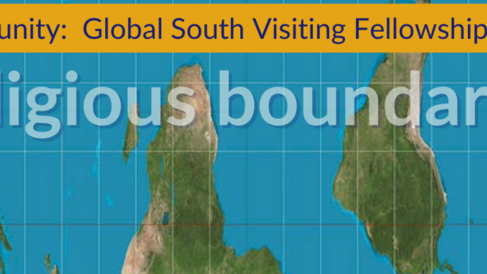
CIP is pleased to be partnering with the Faculty of Divinity and the Centre for Research in the Arts, Humanities and Social Sciences (CRASSH) to invite applications for funded Visiting Fellowships for scholars from the Global South under the theme Religious Boundaries.
Themed call: Religious Boundaries
Applications are invited from scholars whose research is connected to the theme of inter-religious relations, with a particular focus on religious boundary-making. This invites projects that study how two or more religious groups form one another in their mutual encounter, when and how they demarcate difference, and how boundaries between them remain mutable through various activities of exchange such as dialogue or missionary endeavours. The call also welcomes projects that are interested in how religious boundary-constructions relate to other articulations of identity, such as ethnicity, class, politics, or gender.
We invite applications from any discipline, including anthropology, history, philosophy, political science, sociology and theology. Projects should aim to advance current understandings of interfaith conflict and dialogue through concrete case studies of religious boundary-making or ideas about them, situated in the Global South.
Who is eligible?
Up to three Visiting Fellows will be selected from different countries in the Global South whose research proposals respond to the call set out above.
Applicants must be:
- currently employed at a higher education institution or a research institute located in the Global South, on at least a 50% contract, and
- working primarily within the arts, humanities, or social sciences.
For the purposes of this Fellowship scheme, ‘Global South’ is defined as those countries that are included in the OECD’s list of countries receiving Official Development Assistance.
Applicants should have been awarded a PhD at least five years before the date of application.
When will the Fellowships take place?
Visiting Fellows will be appointed for Lent Term 2025 (from mid-January to mid-March: see term dates for each year).
What is provided?
- Return (economy fare) travel,
- Single ensuite accommodation in Wolfson College,
- A stipend to help with additional everyday costs
- Desk space and access to a computer at CRASSH
- Full access to the University’s libraries and other collections,
- Access to events and seminars run by CRASSH, the Faculty of Divinity, the Cambridge Interfaith Programme, and other institutions in the University.
- Membership of the Cambridge Interfaith Research Forum. (Fellows will also be eligible to join the Forum’s Alumni Network subsequent to the Fellowship period.)
The three-month in-person Fellowship will be followed by a nine-month digital Fellowship, allowing continued access to the University’s online events and resources.
What is the closing date for applications?
The deadline for applications is 12:00 (midday) UCT on 26 February 2024. The results of the selection process will be communicated to all applicants before the end of March 2024.
Applicants must answer the following questions:
- Why do you wish to apply for this Visiting Fellowship? What benefits would spending a term at CRASSH and the University of Cambridge bring you? (maximum: 500 words)
- What research will you be conducting while in Cambridge? Please give an outline of your current project and explain which part(s) of it you intend to carry out during the term of your Visiting Fellowship. (maximum: 1000 words)
- Visiting Fellows appointed under this scheme will be asked to work together to design an event, to take place during the term you are in Cambridge, which will provide an opportunity for you to present your own research, alongside others. What ideas would you suggest for the theme and format or such an event? (maximum: 400 words)
For more detailed information about provisions and the selection process, and to apply please visit CRASSH.cam.ac.uk.
About the image: The featured image shows a detail from Daniel R Strebe’s South-up Peters Projection, combining a way of visualising the globe that more accurately reflects the relative sizes of different countries (the Peters Projection), with an inversion of the poles. Read more about this perspective-changing work courtesy of TheConversation.com. Strebe’s images are licensed for reuse on a CC-BY-SA (share-alike) basis.
